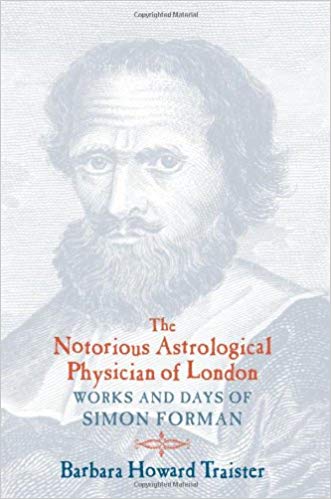Numerous astrologers, alchemists, and occultists were at work during the reign of Elizabeth I, yet biographies about English Renaissance astrologers are rare. Simon Forman was a contemporary of William Lilly, who is known because of his still-popular book, “Christian Astrology,” a go-to text on horary methods since its publication. Surviving manuscripts by Simon Forman prove him to be a rich source of information about the daily work of an astrological physician.
Forman is a unique case because he was implicated in the death of Sir Thomas Overbury, “the most scandalous crime of King Jame's reign..and one that touched the court most intimately.” (p 181) Overbury's death by poisoning in 1613 occurred in the Tower of London two years after Forman's death in 1611. The prosecutor acquired letters written by Overbury's unhappy wife, Frances Howard, and somehow managed to implicate Forman, although his name never appears in the letters, as the supplier of love charms and the deadly poison used to murder her husband. In subsequent years, English writers produced gossipy accounts of the trial that paint Simon Forman as an evil necromancer and sorcerer. His reputation was tainted until 20th century scholars discovered his manuscripts in British research libraries, and were able to rehabilitate Forman's legacy almost 400 years after his death.
Forman was born on December 31, 1552 OS during a Saturn-Pluto conjunction. His father died when he was young. Forman was apprenticed to a pharmacist who promised to provide three years of education. When he failed to follow through on this promise, Forman pursued education on his own. He acquired books and studied astrology and medicine on his own. One book got him into trouble and he spent a few years in jail for owning it (possibly a book of Catholic prayers, a non-starter in Elizabethan England).
Simon's primary income stream was generated through his work as a physician. He relied on astrological charts for diagnosis, shunning the “urine method” and the “pulse method” as unreliable. He relocated to London in the 1580s and set up a medical practice. London's College of Physicians (a guild formed by Henry VIII to ensure adequate medical care for London's growing population) held a monopoly on medical licenses. Forman failed their exam three times but continued to work as a doctor in spite of this. He was sporadically arrested, jailed, or harassed by the College's thugs. Forman eventually relocated to Lambeth, a suburb of London, which was under the writ of the Bishop of Canterbury. The bishop helped Simon get a medical degree from the University of Cambridge in 1603, which more or less legitimized his medical practice. Harassment from the College of Physicians continued until the end of Simon's life in 1611. Forman was successful enough to give London's licensed doctors serious competition, which was probably the reason that the College kept going after him.
Forman's training as an apothecary's assistant led to experiments with alchemy, just as his interest in astrology led him to astrological magic practices. He acquired books and copied numerous texts for his own use. His surviving books were acquired by Elias Ashmole in the 1670s, thus saving them for posterity. Forman kept extensive medical records on his patients, which makes him quite unusual for his time period. This biography describes his annual case loads, patients' ages, gender, and the types of ailments or queries his patients presented him with. Forman also wrote autobiographical materials that were handed down to his son Clement and later preserved by Elias Ashmole.
Forman's medical and astrological career, descriptions of his clientele, his battles with the College of Physicians, and his occult practices occupy the first half of the biography. His book collection, his experiences in London society, and the scandalous Overbury trial are covered in the second half of the book. His widow turned over his personal and professional writings from 1603 to 1611 when they were commandeered by the courts during the murder trial; the fate of these papers remains a mystery.
This biography is well worth reading for astrologers interested in late medieval/Renaissance astrological practices. No other astrologer-physician of that period left such extensive written records with detailed descriptions of medical consultations and diagnosis based on astrological charts. Forman is unique in that respect.
~review by Elizabeth Hazel
Author: Barbara Howard Traister
2001, University of Chicago Press
250 pg, $32.88 hb (new), Kindle $31.45
The Notorious Astrological Physician of London: Works and Days of Simon Forman

©
2010 - 2025
Facing North
